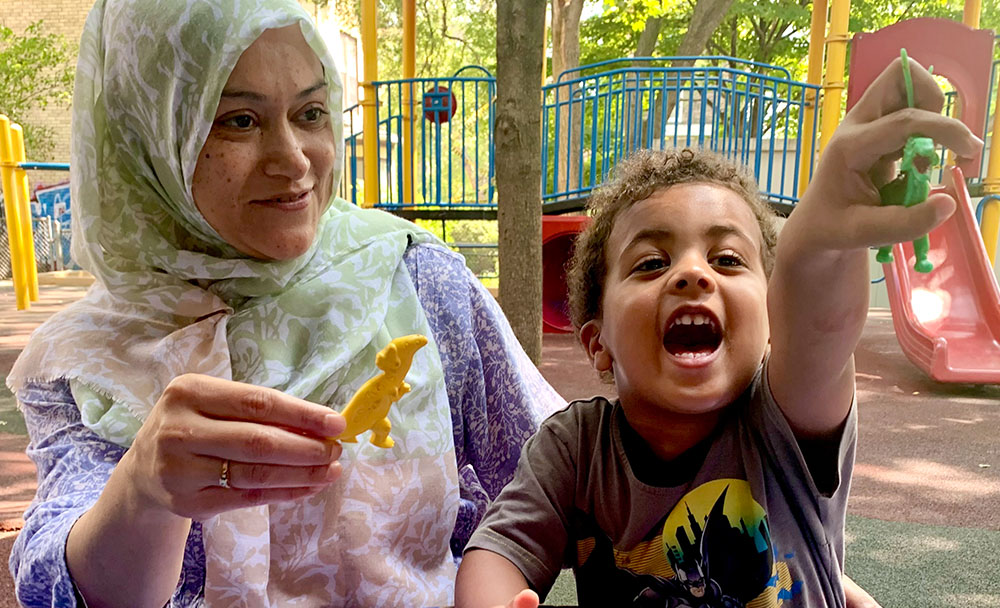Comprehending the Importance of Day Care for Your Young child's Social Development and Knowing Experiences Through Engaging Activities
The importance of childcare fit a kid's social development and learning can not be overstated, as it supplies a structured atmosphere full of engaging tasks that are pivotal for very early development. These experiences not only improve social communication however additionally offer as a vital platform for creating interaction skills, psychological guideline, and durability. Understanding just how these aspects interconnect can give insight into promoting self-reliance and self-confidence in little ones. As we discover the complex advantages of childcare, one have to consider how these foundational experiences influence a child's future social communications and overall advancement.

Benefits of Social Communication
Social interaction plays a crucial function in the developing trajectory of kids, acting as a structure for crucial social abilities. Engaging with peers allows kids to practice communication, discover to reveal their emotions, and create compassion. Through shared play and participation, they start to comprehend social norms, such as taking turns and sharing, which are crucial components of successful interpersonal relationships.
Additionally, social communications add to cognitive development. As toddlers interact with their peers, they enhance their language skills, broaden their vocabulary, and boost their ability to verbalize sensations and ideas. This exchange of ideas promotes vital reasoning, as kids discover to negotiate, resolve issues, and navigate disputes.
Additionally, social interaction promotes psychological regulation. Direct exposure to numerous social situations aids toddlers acknowledge and handle their emotions, ultimately leading to better durability and versatility. The capacity to develop friendships and accessories also boosts their sense of belonging and self-esteem, which are essential for total well-being.
Importance of Engaging Tasks
Involving tasks are vital for promoting a stimulating atmosphere that improves toddlers' social advancement. These tasks not just mesmerize kids's attention yet likewise advertise active involvement, enabling them to explore their surroundings artistically. Through play-based discovering, young children create vital abilities such as analytic, teamwork, and empathy, all of which are crucial for building healthy and balanced partnerships with peers.
Joining engaging activities, such as team video games, art projects, and interactive narration, urges toddlers to express their ideas and sensations. This expression is vital for emotional knowledge and aids them recognize the perspectives of others. Moreover, when toddlers participate in these tasks together, they discover to bargain functions, share sources, and work together, which are essential facets of social communication.
On top of that, a well-structured environment that consists of diverse and stimulating activities helps in keeping toddlers encouraged and concentrated. This motivation fosters a love for discovering and exploration, laying the structure for future academic experiences. Inevitably, involving activities in childcare settings are critical in shaping social abilities, preparing young children for effective communications past the classroom, and nurturing their general advancement during these developmental years.
Developing Communication Abilities
Efficient communication abilities are critical for young children as they navigate their very early social interactions. In a childcare setting, youngsters are subjected to varied social situations that urge spoken and non-verbal communication. Engaging in discussions with peers and caregivers fosters language advancement, enabling young children to share their ideas, emotions, and needs better.

Furthermore, childcare atmospheres provide chances for kids to simulate and observe communication designs of their grownups and peers. This empirical learning is important as children detect social hints, tone, and body movement, which are vital components of reliable communication.
Fostering Freedom and Confidence
As young children refine their communication skills, they at the same time begin to explore their freedom and build self-confidence in social settings (baby daycare near me). Daycare provides a structured setting where children can participate in various activities that encourage navigate to these guys freedom. From choosing their own activities to taking part in team tasks, these experiences encourage toddlers to choose and share themselves
In a day care setup, children are usually offered with possibilities to address problems individually, whether it's finding out just how to share playthings or fixing conflicts with peers. This fosters essential reasoning and promotes self-direction. Additionally, caretakers sustain this development by supplying favorable reinforcement and advice, assisting kids to navigate social communications with self-confidence.

Group activities, such as participating games or collaborative art tasks, assist in synergy and instruct toddlers the relevance of interacting. Via these communications, kids find out to interact their sensations and ideas, even more enhancing their self-confidence and social abilities.
Ultimately, fostering independence and confidence in day care not just prepares young children for future social atmospheres but likewise prepares for a durable way of thinking, furnishing them with crucial life abilities as they continue to grow and learn.
Building Lifelong Understanding Foundations
A solid structure for long-lasting understanding is important for young children, as their early experiences shape their attitudes in the direction of education and curiosity. Daycare environments play an essential function in this developing phase by offering organized chances for expedition and engagement. Engaging activities, such as group play, arts and crafts, and interactive narration, boost cognitive development while encouraging social interaction.
Through these experiences, kids learn necessary skills such as problem-solving, communication, and teamwork. They are presented to the concept of learning as an enjoyable, collaborative process as opposed to a job, which promotes a positive perspective towards education. Moreover, exposure to varied viewpoints and peer communications in daycare setups boosts emotional intelligence, promoting empathy and durability.
Caregivers and instructors likewise contribute considerably to building this structure by modeling curiosity and enthusiasm for knowing. By motivating questions and facilitating conversations, they develop a setting where children feel safe to share themselves and explore originalities. Ultimately, the combination of supportive relationships and engaging tasks in day care settings prepares for a long-lasting love of discovering, outfitting young children with the skills and frame of mind essential for future academic and personal success.
Conclusion
:max_bytes(150000):strip_icc()/GettyImages-956997658-af489cbf5e3b4a2cbe26e2e78016a0a2.jpg)
The significance of daycare in forming a young child's social development and discovering can not be overstated, as it offers an organized atmosphere filled up with interesting activities that are essential for very early growth.Social communication plays a critical role in the developmental trajectory of kids, serving as a structure for important social skills. When young children engage in these tasks with each other, they learn to work out roles, share resources, and team up, which are essential facets of social communication.
Ultimately, engaging activities in day care settings are pivotal in forming social skills, preparing toddlers for successful communications past the classroom, and nurturing their total advancement during these formative years.
Ultimately, the advantages of interesting activities in daycare settings play a significant role in preparing kids for future social interactions and challenges. daycare for infants near me.